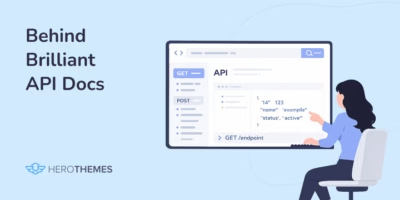12 Best AI Virtual Assistants for Small Businesses (2026 Guide)

Running a small business means wearing a dozen hats at once—answering customer emails at midnight and coordinating meetings at dawn, for example.
Try these AI virtual assistants that can handle customer questions, schedule appointments, take meeting notes, and even draft content while you focus on the big picture.
Let’s dive in!
In This Guide
How I Researched the Best AI Virtual Assistants
Here are the evaluation criteria I used to list out the best AI Virtual Assistants from the hundreds of options available in 2026:
- Ease of Use: I looked for assistants that don’t require a PhD to set up or use.
- Capabilities and Intelligence: Tested how well each AI understands natural language and handles tasks.
- Integration and Training: A huge factor was whether the assistant can integrate with your business tools or learn from your data. The winners could connect to things like your calendar, email, or knowledge base; and some even let you train them on your own documentation for personalized answers.
- Human Handoff: No AI is perfect. In customer support, AI assistance should seamlessly hand over a conversation to a team member when a question stumps them.
- Value for Money: Small businesses need to get their money’s worth, and each assistant listed in this guide offers just that.

We rigorously test and research every product that we recommend through HeroThemes. Our review process. We may also earn a commission if you make a purchase through our links.
Best AI virtual assistants for small business in 2026
1. Heroic AI Assistant (Heroic Knowledge Base)

The Heroic AI Assistant is an AI chatbot designed for customer support on WordPress based sites.
It’s trained exclusively on your business’s own help articles and FAQs. Unlike generic chatbots that scrape the web and sometimes go off the rails, Heroic AI sticks to your verified content for accurate, on-brand answers.
If you run a small business with a WordPress site and a documentation section or FAQ, this assistant can instantly make your customer experience better with relevant human-like answers.
Key Features:
- Trained on Your Content: Heroic AI Assistant feeds on your knowledge base articles, which hugely reduces misinformation.
- 5-Minute WordPress Setup: Since it’s a WordPress plugin, you just install Heroic KB, toggle on the AI Assistant, and drop in your OpenAI API key, no coding needed.
- Seamless Web Widget: The assistant appears as a chat widget on your site that you can brand to match your colors
- Intelligent Handoff: Heroic AI knows its limits. When a question is too complex or outside its knowledge (like account-specific issues), it gracefully escalates to your support team or directs the user to submit a ticket.
- Multilingual support
Pricing
Heroic AI Assistant itself comes included with the Heroic Knowledge Base plugin, which starts at $67/year for the Essential plan.
There’s no extra fee per chat or per answer, you just bring your own OpenAI API key (the AI brain behind it) and pay OpenAI usage, which is usually just fractions of a penny per query.
My Take
The Heroic AI Assistant is straightforward and doesn’t overpromise—it simply turns your FAQs into a smart helper. For any small business running a WordPress site (or anyone looking for improving customer service), this is hands-down my top pick to automate customer Q&A without sacrificing quality.
2. Microsoft 365 Copilot

Microsoft 365 Copilot is like having an AI-powered executive assistant living inside your Office apps.
If your business lives in Outlook, Word, Excel, or Teams, Copilot integrates into all those tools to help draft emails, analyze spreadsheets, summarize meetings, and even generate slideshows from notes.
For me it is more like a supercharged Clippy (remember Clippy?) that actually understands context.
Key Features:
- Embedded in Office Apps: Copilot shows up as a sidebar or chatbot in apps like Word, Excel, PowerPoint, Outlook, and Teams.
- Email and Calendar Wizard: It works with Outlook inbox, summarizing long email threads, suggesting replies, or extracting key points.
- Data Analysis and Reports: In Excel, Copilot can write formulas or even explain what a complex formula does (finally!).
- Team collaboration in teams
Pricing
Microsoft 365 Copilot comes as an add-on to Microsoft 365 business plans.
Currently, the pricing with Copilot includes costs around $36 per user per month.
My Take
Copilot shines only if you’re using Microsoft 365 apps day in, day out. If that’s you, Copilot can seriously amplify your output and is probably worth the investment. If not, you might get similar help from cheaper stand-alone AI assistants from this list.
3. Google Gemini
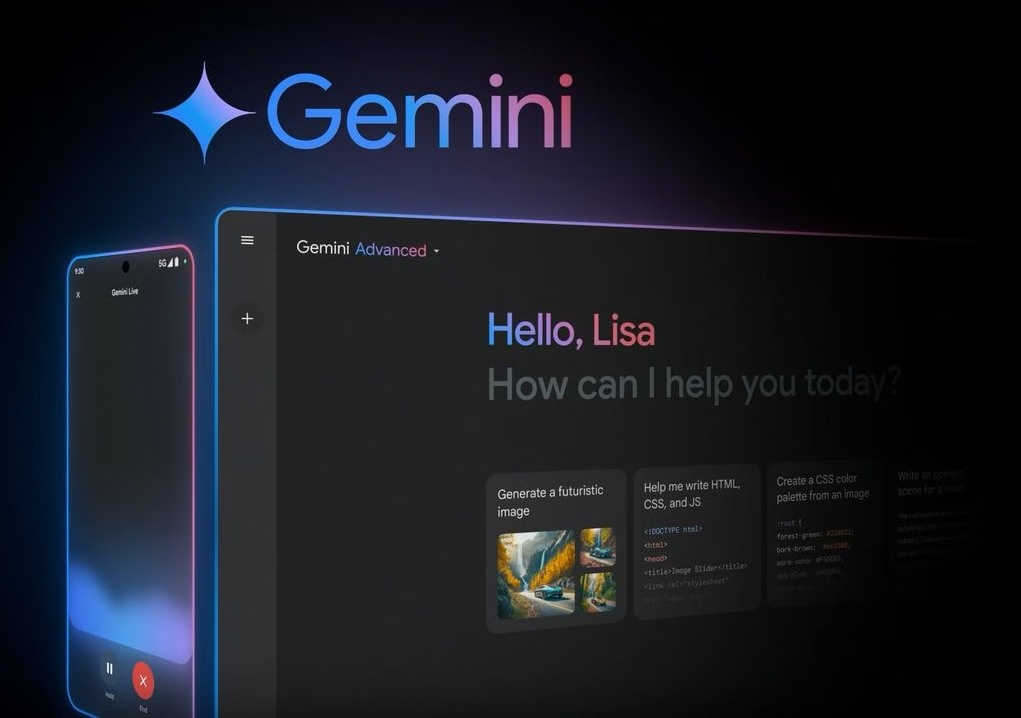
Google Gemini is Google’s answer to ChatGPT, an AI assistant you can chat with to get information, generate content, or brainstorm ideas.
Google’s Gemini is web-based and free to use, making it an accessible AI aide for any small business.
Ask Gemini to draft a social media post, improve a product description, or even help with coding a bit of script, and it will produce a conversational answer.
Key Features:
- Great for general knowledge and Q&A
- Creative Content Generation: I’ve used it to generate draft marketing copy—sometimes it’s spot on, other times it needs tweaking, but it beats staring at a blank page.
- Ability to to create code snippets or Google Sheets formulas
- Integrated with Google Workspace (Duet AI)
- Voice and multilingual support
- Continual learning with search
Pricing
Gemini is free. You just need a Google account to use it. That’s a huge plus for small businesses on a budget.
To access Gemini’s newer models or advanced features such as NotebookLM, Jules, or better integration with Google Apps, you will need to subscribe to one of the premium plans.
My Take
Google’s Gemini has evolved fast. Initially, it was a bit behind ChatGPT in creativity, but it’s closing the gap and has the advantage of real-time knowledge.
For me, Gemini excels in research and content drafts, and its ability to integrate with other Google products is impressive.
4. Apple Siri
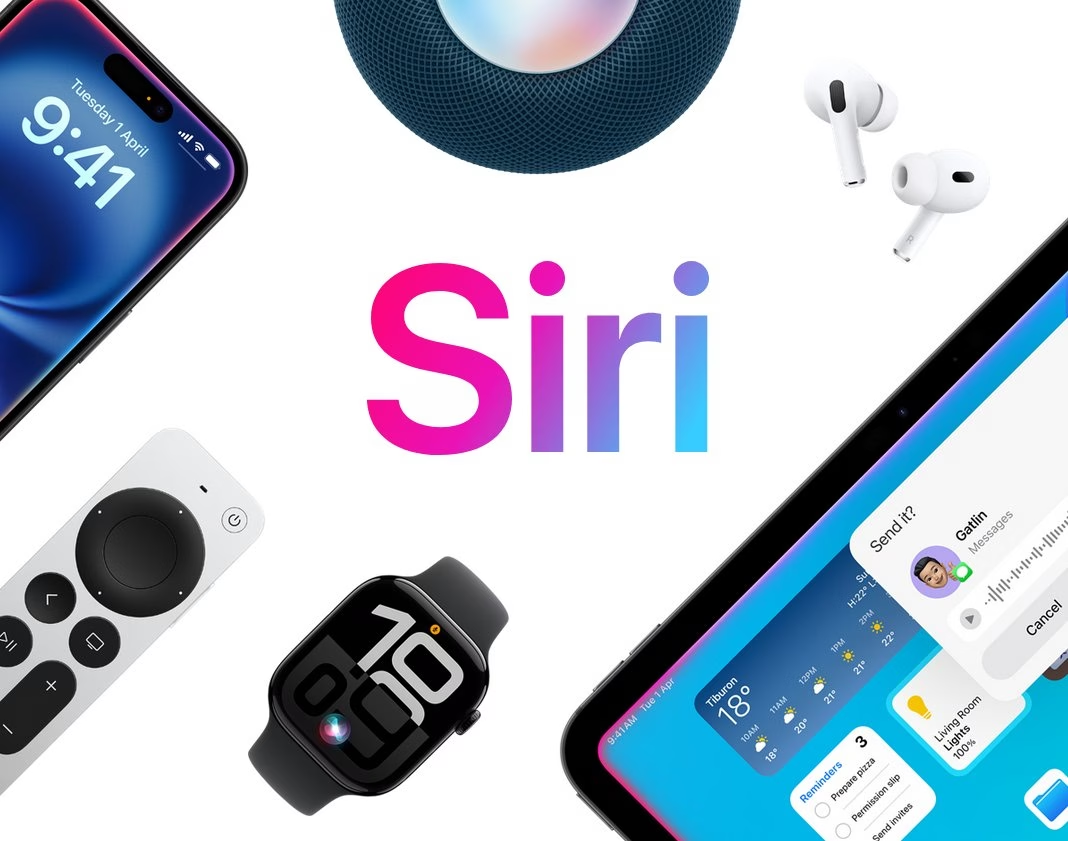
Siri is Apple’s built-in virtual assistant, famous for debuting on the iPhone and now present across all Apple devices (Macs, iPads, Apple Watch, HomePod).
For Apple-centric small business owners, Siri can be a handy personal assistant to help with daily tasks using just your voice or a few taps.
You can use Siri to send messages or emails by dictation, setting up meetings, getting directions to your next appointment, and even shortcuts to automate multi-step workflows on your device.
Key Features:
- Voice Commands Across Apple Ecosystem: With Siri you can text colleagues, call clients, or send a quick email just by voice. For example, “Hey Siri, send an email to Katie saying I’ll send the report by 5.” Siri will draft and send it.
- Calendar and Reminders: Siri integrates deeply with Apple’s Calendar and Reminders.
- Siri Shortcuts (Automation): You can program Siri to do multi-step tasks.
- Device Control and Dictation: Siri can adjust settings on your device (brightness, Wi-Fi, etc.), which is minor but neat.
- Privacy and Security: Apple emphasizes that Siri is designed to protect user data. Requests are processed anonymously and many tasks are handled on-device (especially on newer iPhones with the Neural Engine).
Pricing
Siri is completely free to use on Apple devices. It’s part of the Apple experience. Of course, that means you need to have an Apple device (iPhone, Mac), which comes at a premium cost.
My Take
Siri is quietly useful. In daily grind, Siri is like a reliable (if a bit straightforward) assistant. It won’t write your business plan, but it will reliably send your texts, recall your appointments, and play your favorite focus music while you work.
5. Samsung Bixby
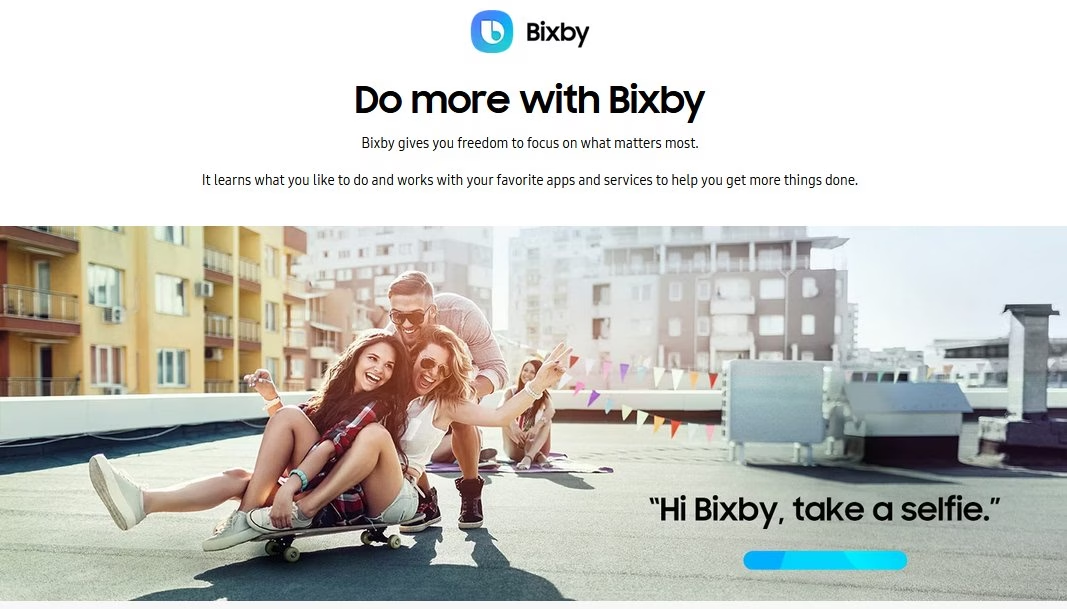
Bixby is Samsung’s AI assistant, built into Samsung Galaxy phones, tablets, and even appliances.
If you’re a Samsung user, Bixby is essentially your Android’s Siri/Alexa equivalent, but with some unique capabilities in device control and task automation.
Key Features:
- Voice Commands for Daily Tasks: Send messages, make calls, set reminders or alarms. This is standard stuff, but Bixby generally does fine with it. In my tests, it executed phone functions reliably, like “Bixby, text my 2 PM client that I’m on the way.”
- Bixby Routines (Automation): For example, at 9 AM on weekdays (trigger) -> turn off silent mode, open my to-do app, and read out the day’s schedule (actions). Or when you leave the office location, it can automatically send an “On my way home” text to your partner.
- Contextual device control
- Bixby Vision and Translate: Bixby also has a visual component (via your camera) where it can translate text in images or identify objects/places.
- Personalization and Learning: Samsung claims Bixby adapts to your usage over time, learning your routines and preferences.
Pricing
Bixby is free and comes on Samsung devices by default. There’s no cost to use it aside from owning the Samsung device itself.
My Take
Bixby has been underrated. If your small business workflow revolves around your Samsung phone, Bixby can shave off seconds here and there.
6. OpenAI ChatGPT

ChatGPT is the AI that kicked off the current AI assistant boom, and it remains an incredibly powerful virtual assistant for a variety of business tasks.
ChatGPT is a super-smart content generator and problem solver that you can chat with about almost anything.
Many small businesses have embraced ChatGPT for drafting emails, writing marketing copy, brainstorming business ideas, answering technical questions, and even writing code for simple tools.
For me, ChatGPT’s strength is the natural, conversational way you can interact with it—you just type like you’re talking to a colleague.
Key Features:
- Content and Copywriting Machine: ChatGPT can easily produce a blog post, product description, or social media content.
- Question Answering and Research: You can ask ChatGPT to explain complex concepts or answer questions you might otherwise Google, but in a more digestible way.
- Coding and Data Assistance: For small businesses without a full-time developer, ChatGPT can actually write small bits of code or help with formulas.
- Brainstorming and Strategy: Sometimes I treat ChatGPT like a brainstorming partner. “Give me 5 guerrilla marketing ideas for a local bakery” or “What are some ways to improve customer retention for a SaaS product?”. The ideas it spits out might not all be gems, but they often spark a direction or perspective I hadn’t considered.
Pricing
ChatGPT has a generous free tier with the only limitation being it uses the slightly less advanced model.
The paid ChatGPT Plus is $20 per month, which grants you access to the more advanced GPT-5 model, priority speed, and new features like plugins and browsing mode.
My Take
I see ChatGPT as an affordable extra team member that’s always available. The free version is great for occasional tasks, and the paid version pays itself in my case with the time saved on writing and research.
7. Anthropic Claude
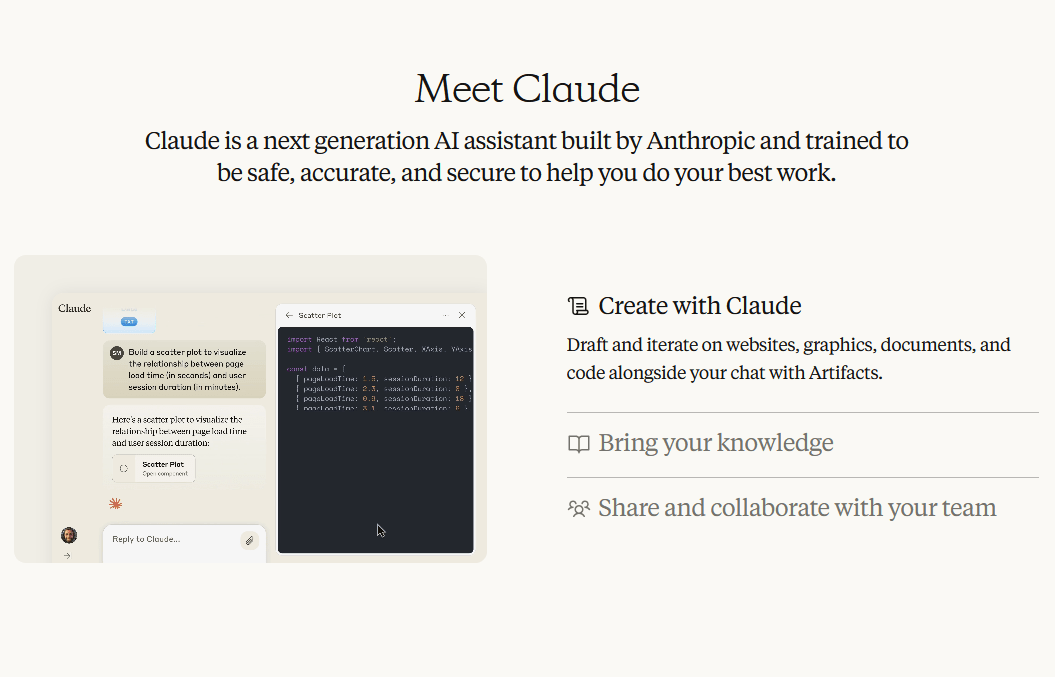
Claude by Anthropic is another AI assistant model, similar to ChatGPT, that has been gaining attention for its capable and friendly responses.
If ChatGPT is like an all-knowing intern, Claude is like the thoughtful colleague who might take a bit longer to answer but often provides a very detailed and polite response.
One of Claude’s standout features is its ability to handle very large inputs. This makes it useful if you want an AI to analyze, say, a lengthy business report or even a book chapter and summarize it or extract info.
Key Features:
- Handles Long Content: Need an AI to go through a 50-page PDF or a long meeting transcript? Claude can do that.
- Detailed and conversational writing
- Brainstorming and Ideation: Much like ChatGPT, Claude can brainstorm ideas or give creative suggestions. Claude’s style can be a bit more “human-like” in certain cases.
- Integration via API and apps
- Focus on safety
Pricing
Anthropic’s Claude has a free version with limited access. Claude Pro (starting at $17 per month) gives more usage and priority access to the latest model.
My Take
Claude gives a more structured answer or adds a perspective I didn’t get from ChatGPT. If you find ChatGPT useful, give Claude a try too. It’s like having two very smart employees with slightly different personalities—diversity of thought can be beneficial!
8. IBM watsonx

IBM watsonx is a conversational AI platform from the pioneers of AI in business, IBM’s Watson.
watsonx is geared a bit more towards the customizable side. You can train it on your own data, deploy it on your website, in your app, or even on a phone line for automated call responses.
For small businesses that have a bit of technical resources or are serious about a highly custom AI chatbot, IBM watsonx Assistant provides robust tools and integration capabilities.
It might not be as plug-and-play, but it’s very powerful and known for handling enterprise-level conversations.
Key Features:
- Multi-Channel Deployment: It can be deployed on your website chat, mobile app, messaging platforms like WhatsApp or Slack, and even as an interactive voice response (IVR) on phone systems.
- Custom Training and Integration: You can train in on your FAQs, company info, or connect it to a database.
- Dialog Flow Editor: Visual dialog editor where you define the conversation flow and “intents” (user’s goals).
- The AI will also learn from real conversations and improve its intent detection over time.
- Contextual AI and Memory
- Analytics and Human Handoff: It has an analytics dashboard to show you what users are asking and where the bot might be faltering.
Pricing
IBM offers a Lite plan (free) to try watsonx AI Assistant. The standard plan which starts around $1050/month.
My Take
IBM watsonx might be a stretch to implement at full potential, but IBM has partners and a community to help, and the Lite plan means you can try without cost.
If you want an assistant that’s highly professional and you have a vision for custom integrations (and maybe some growth plans), watsonx is worth looking into. It’s an enterprise-grade tool that’s also reachable for smaller players if you’re willing to invest a bit in setup.
9. Motion: AI Employees
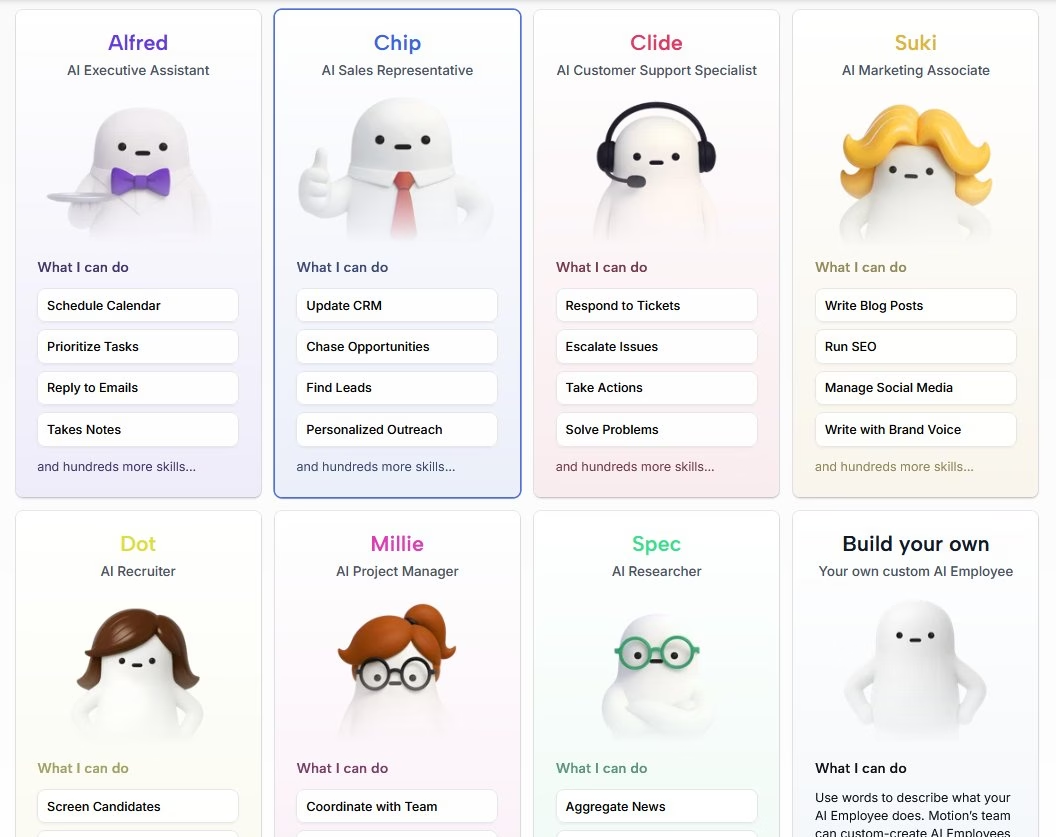
Motion’s AI Employees can be a great way to automate some of the tasks in the Motion.
Imagine if a smart algorithm could look at all your tasks, meetings, and deadlines, then shuffle and prioritize them optimally on your calendar—that’s Motion AI.
Key Features:
- Hundreds of possible automation: Prioritizing tasks, replying emails, writing blog posts, creating reports, you name.
- Meeting scheduling and conflict avoidance
- Hundreds of integrations
- Enterprise Grade Security
Pricing
Motion is a premium productivity tool and is priced accordingly. The plan starts around $29/month per user (billed annually) for the AI Workplace plan.
My Take
Motion has managed to integrate AI with its system in a way that is useful at automating stuff that most of us forget. If you use Motion (or similar work management platform), give this feature a try. It can be a game changer for you and your team.
10. Fireflies.ai: Meeting Assistant
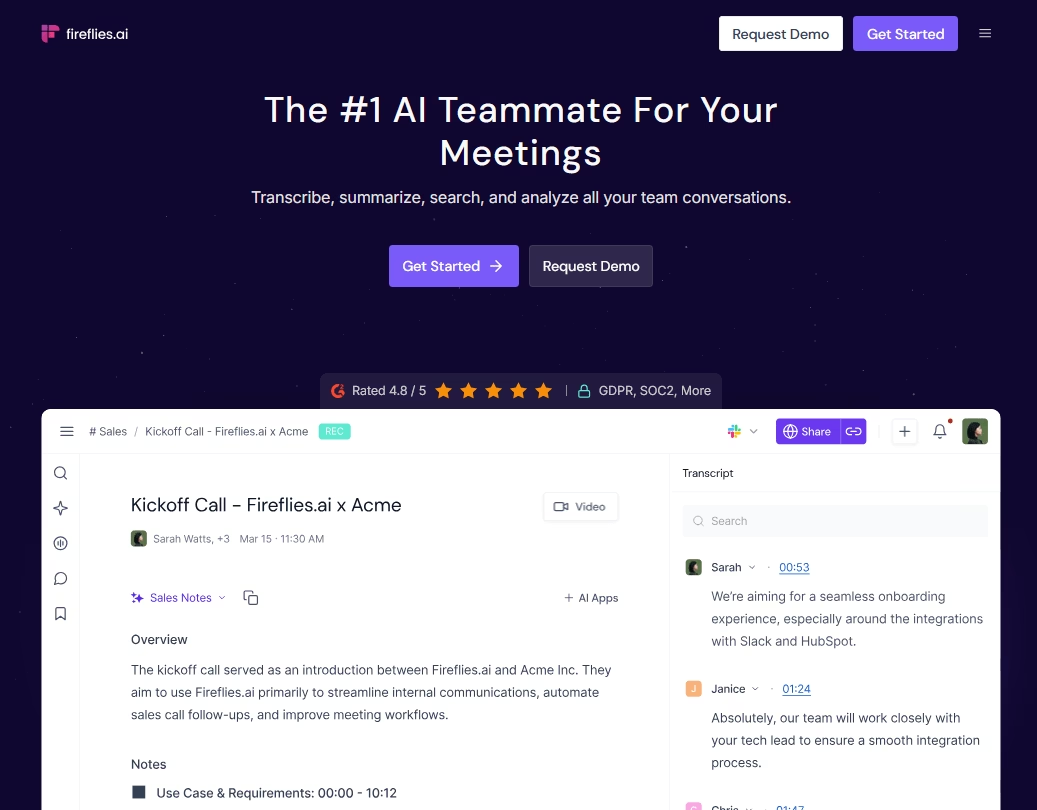
Fireflies.ai is an AI meeting assistant that automatically joins your meetings (Zoom, Google Meet, Teams), records them, transcribes everything that was said, and even provides you with summaries and action items afterward.
For any one that spends a lot of time in meetings or calls, Fireflies is like having a dedicated note-taker who never misses a detail.
Post-meeting, you can search the transcripts for specific keywords (no more “what did the client say about pricing?” doubts) and share summaries with people who couldn’t attend.
Key Features:
- Automatic Transcription: The accuracy is quite high, and it supports over 100 languages for transcription.
- AI Summaries and Notes: It generates a concise summary of the meeting, plus identifies things like action items, decisions made, and key questions.
- Searchable meeting database
- Integrations and workflows
- Speaker Identification and Analytics: It can distinguish speakers, labeling them in the transcript, and it even does basic sentiment analysis (was the speaker sounding positive or negative).
Pricing
Fireflies offer a free plan that lets you have 800 mins of storage/seat per month. The Pro plan is around $10 per user/month, which gives more space and features.
My Take
For any small business that lives on calls, Fireflies is almost a must-have. It turns talk into tangible notes and tasks, ensuring follow-through.
11. Jasper AI Content Assistant

Jasper is an AI writing assistant geared towards marketing and content creation. It’s a platform with an interface optimized for content teams and entrepreneurs to churn out high-quality written material at scale
If you do a lot of content marketing, social media, or copywriting in general, Jasper can be your smart buddy.
It’s powered by advanced language models (similar to GPT) but adds a layer of control and templates that are very useful for business needs.
Key Features:
- Content Templates and Recipes: A ton of templates for different use cases. For example, there are templates for writing Amazon product descriptions, SEO blog post intros, or marketing emails.
- Tone and style adjustment
- Long-Form Document Editor: It has an editor interface (similar to Google Docs) for writing longer content.
- Integration and Browser Extension: Has a Chrome extension that lets you use it across the web. So it can help you write directly in Gmail, WordPress, or social media sites.
- Training and brand voice memory
Pricing
Jasper is a premium service. The Pro plan starts around $59/month for 1 seat.
My Take
The price can be a hurdle for some. If you only write one small piece per month, it can be difficult to justify the cost.
But for active marketing, consider the cost compared to outsourcing copywriting or the value of your time. For me and many others, Jasper is worth it.
12. Zoho Zia: AI for Business Suite
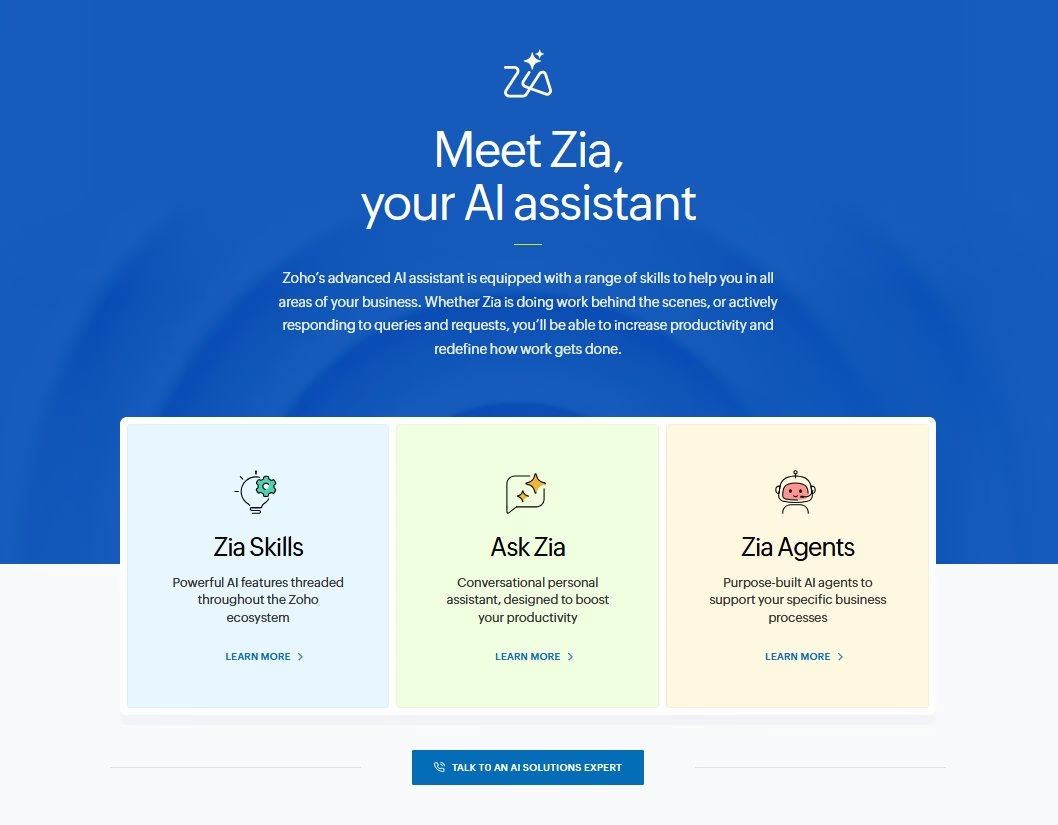
Zia is Zoho’s AI assistant that is woven across many of the Zoho business applications (Zoho CRM, Zoho Desk, Zoho Mail).
If you use Zoho’s suite of software (which is popular as a budget-friendly alternative to things like Salesforce or Google’s suite), then Zia becomes a multi-talented helper in that ecosystem.
Key Features:
- AI in CRM (Sales Zia): Zia acts like a sales coach. It can forecast sales trends and identify anomalies (e.g., “Hey, this deal is dragging past close date, maybe follow up”).
- Zia in Customer Service (Zoho Desk): Zia can serve as a chatbot for customer support. The Answer Bot uses your knowledge base to answer customer questions on your website or chat.
- Email and writing assistant
- Analytics and insights
- Task automation
Pricing
Zia is included as part of Zoho’s apps, and there isn’t a separate fee just for Zia.
My Take
I played with Zia in Zoho Writer to help draft a sales pitch. It wasn’t as elaborate as Jasper or ChatGPT, but being right in my doc was convenient. The real benefit is integration with the Zoho software environment.
Final Thoughts
In today’s fast-paced world, even small businesses can punch above their weight by leveraging AI virtual assistants.
They save you time and help you serve customers better, all without requiring a big-team budget.
If you’re feeling overwhelmed, pick one or two areas that eat up most of your time (be it handling calls, writing content, or managing your calendar) and trial the recommended AI assistant.
At the end of the day, AI assistants are tools, not magic. But used well, they can make you feel like a productivity superhero.
Now, which AI assistant will you invite into your business?


